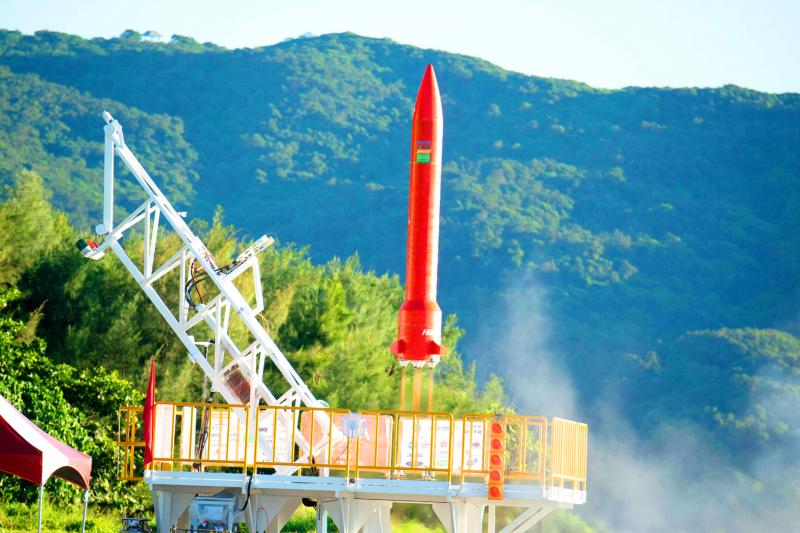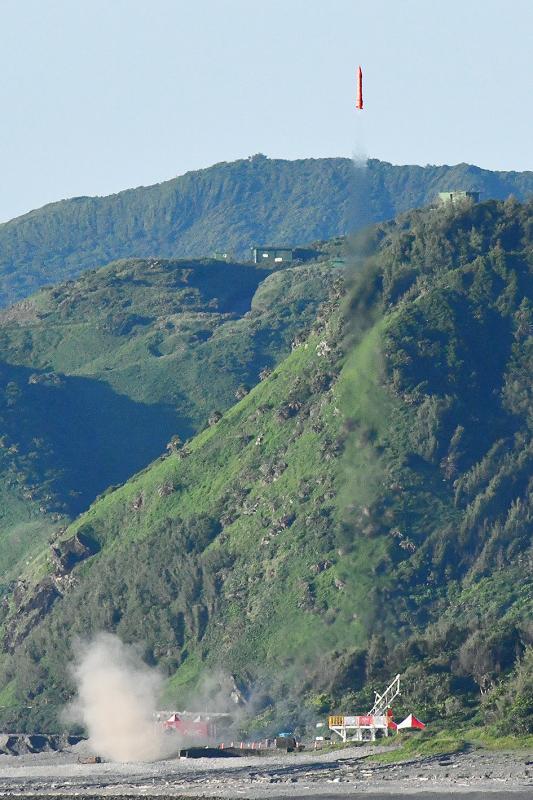Researchers from National Yang Ming Chiao Tung University’s Advanced Rocket Research Center (ARRC) yesterday successfully tested the second-stage propulsion system of a domestically designed rocket.
Minister of Science and Technology Wu Cheng-chung (吳政忠) lauded the test of the HTTP-3A sounding rocket’s propulsion system, saying it demonstrated the integration of industry and academia in Taiwan at a time when the global space industry is developing.
The test, which was originally scheduled for May 3, began at 6:12am yesterday, with the rocket launching from Syuhai Village (旭海) in Pingtung County’s Mudan Township (牡丹).

Photo provided by the National Space Center
According to the initial flight plan, the 4.8m, 365kg rocket was to lift off vertically for five seconds before arcing out over the sea, when its engine would shut off after 60 seconds and a drogue parachute would deploy after 90 seconds.
Then, after reaching a lower altitude, it would release a second parachute and land in the sea, having reached an altitude of 12km during an eight to 10-minute flight.
Yesterday’s launch fell short in that regard, as the rocket stayed in the air for two minutes and reached a maximum altitude of about 3km, but it was nevertheless “99 percent successful,” the ARRC said.

Photo: Tsai Tsung-hsien, Taipei Times
The launch tested the rocket’s hybrid propulsion system — which uses a mix of liquid and solid-state propellants — navigation system, ground controls, recovery parachute and launch preparations, it added.
The hybrid-fuel sounding rocket does not need navigation assistance to guide its flight, ARRC director Wei Shih-hsin (魏世昕) said, adding that after vertical takeoff the rocket can adjust its flight path, thrust magnitude and thrust vector by itself.
“The HTTP-3A is the world’s first hybrid rocket with guidance and control technology. Although it is not capable of flying very high, it represents a major technological breakthrough,” he said.
The launch allowed the team to test its self-developed, six degrees of freedom mission-analysis simulator, called ZIYASim, he said, adding that it was the first successful rocket launch at the launch site.
“It was much hotter than in May when we were first scheduled to launch, making it a harsher work environment, but the team lived up to expectations,” he said. “The team showed that ZIYASim achieves great accuracy, and all of the data we gathered will be used for the next stage as we move toward launching satellites.”
The media’s reporting of the launch since May has focused attention on Taiwan’s domestic space industry, and the Ministry of Science and Technology’s support made it possible to ensure that the launch site and facilities were ready in just one month, he added.
Additional reporting by CNA

CHAOS: Iranians took to the streets playing celebratory music after reports of Khamenei’s death on Saturday, while mourners also gathered in Tehran yesterday Iranian Supreme Leader Ayatollah Ali Khamenei was killed in a major attack on Iran launched by Israel and the US, throwing the future of the Islamic republic into doubt and raising the risk of regional instability. Iranian state television and the state-run IRNA news agency announced the 86-year-old’s death early yesterday. US President Donald Trump said it gave Iranians their “greatest chance” to “take back” their country. The announcements came after a joint US and Israeli aerial bombardment that targeted Iranian military and governmental sites. Trump said the “heavy and pinpoint bombing” would continue through the week or as long

TRUST: The KMT said it respected the US’ timing and considerations, and hoped it would continue to honor its commitments to helping Taiwan bolster its defenses and deterrence US President Donald Trump is delaying a multibillion-dollar arms sale to Taiwan to ensure his visit to Beijing is successful, a New York Times report said. The weapons sales package has stalled in the US Department of State, the report said, citing US officials it did not identify. The White House has told agencies not to push forward ahead of Trump’s meeting with Chinese President Xi Jinping (習近平), it said. The two last month held a phone call to discuss trade and geopolitical flashpoints ahead of the summit. Xi raised the Taiwan issue and urged the US to handle arms sales to

BIG SPENDERS: Foreign investors bought the most Taiwan equities since 2005, signaling confidence that an AI boom would continue to benefit chipmakers Taiwan Semiconductor Manufacturing Co’s (TSMC, 台積電) market capitalization swelled to US$2 trillion for the first time following a 4.25 percent rally in its American depositary receipts (ADR) overnight, putting the world’s biggest contract chipmaker sixth on the list of the world’s biggest companies by market capitalization, just behind Amazon.com Inc. The site CompaniesMarketcap.com ranked TSMC ahead of Saudi Aramco and Meta Platforms Inc. The Taiwanese company’s ADRs on Tuesday surged to US$385.75 on the New York Stock Exchange, as strong demand for artificial intelligence (AI) applications led to chip supply constraints and boost revenue growth to record-breaking levels. Each TSMC ADR represents

Pro-democracy media tycoon Jimmy Lai’s (黎智英) fraud conviction and prison sentence were yesterday overturned by a Hong Kong court, in a surprise legal decision that comes soon after Lai was jailed for 20 years on a separate national security charge. Judges Jeremy Poon (潘兆初), Anthea Pang (彭寶琴) and Derek Pang (彭偉昌) said in the judgement that they allowed the appeal from Lai, and another defendant in the case, to proceed, as a lower court judge had “erred.” “The Court of Appeal gave them leave to appeal against their conviction, allowed their appeals, quashed the convictions and set aside the sentences,” the judges